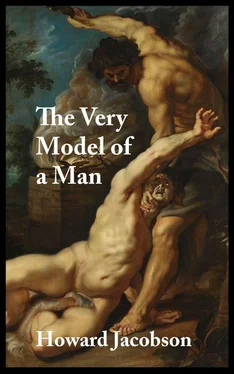You think I’m talking about making a gift, but actually I’m addressing the idea of release.
From captivity?
In a sense, yes.
Like this bullock you are dismembering –
The bullock doesn’t enter into it. What matters is that I’m parting with something, allowing something to be taken from me.
And why does that matter?
Because it accustoms me to the idea that I will be taken myself.
So you’re saying that you’re practising.
He thought about that, narrowing his vision as though the thing he wanted to say hung like a spider on its thread at the very vanishing point of sight. Seeing how much it hurt him to think was one of the voluptuous pleasures I derived from these encounters.
In a sense, yes, he said. Though it’s not dying, exactly, that I’m practising, but diminution. I’m getting used to going, bit by bit.
So young, I said, and yet so morbid. There was, I now acknowledge, flirtation in my tone: the sort of challenge that hopes both to conceal and to reveal admiration. So young and yet so morbid — I could not have wooed more frankly had my brother been my beloved. But then there was no beloved.
Did he flush? Did this bring colour at last into his face? It was impossible to tell, so blackened and gory was he from practising his own going on the carcasses of hapless animals. But he did not accept the charge of morbidity. Not at all, he said. It is not morbid to prepare for death in life. You’re the morbid one, fearing dying so much that life which must end in dying disgusts you.
One thing is not another, I said. Like and unlike are better kept separate.
You said that last time. And you are right — life is not death. But neither are they complete strangers to each other. If we can allow a little death in life –
Then we may look forward to a little life in death? Is this why you burn meat — in the hope of striking an advantageous bargain? O Lord, who seest how I stalk among the dead in life, please grant that I may move among the living in death.
I saw him struggle with the disposition of his mouth, but there was nothing he could do against its ugly will. The corners dropped. The bottom lip skidded off the top. His jaw lurched. I wondered if he meant to daub me with the marks of greed and covetousness again, but he surprised me — instead, he dipped his reeking fingers into veins of family history that were never opened.
It’s not your fault, he said, that the sin to which your birth is attributed is payable with mortality. It’s not your fault. I don’t blame you. You are a child of death and cannot bear what you brought into the world with you. It’s not my connection to death that is morbid, it’s yours.
I stared at him. Didn’t I say he was clever? I stared at him for so long and with such admiration that the heavens began to fear seriously for their supper. The hills rumbled. The horizon, which had turned so blue recently with gratitude that we thought we could actually see sea beyond it, snapped shut against the sky, squeezing whatever clouds were trapped between into a grey dyspeptic dust.
A lick of flame, like a cat’s tongue, passed across the face of the sun.
Thank your towers that you do not get to see much of the sun in the late hungry afternoon. We had no such protection. Short of lying belly down on the squirming earth and covering our heads with dust, we knew of no system for blinding ourselves to its voraciousness. We watched it boil. We watched it swell. We watched it pulse like an angry throat, or sometimes fall open, indolently, as though put to sleep, sent into a pre-dinner doze, by its own expenditure of heat and energy.
I was caught between radiances — my brother’s cleverness, the sun’s angry insatiable repletion.
I’ll tell you what, I told my brother, I’ll go and roast some grain…
But I put it in the form of a proviso. I’d roast some grain, provided he thought that was a good idea, provided he’d love me for it, provided he’d withdraw the charge of morbidity, provided he’d ask me to roast some grain…
Not a word from him. What I did I was to do for myself.
I’ll tell you what, I told the sun, I’ll go and roast some grain for you.
Heavenly bodies are not as proud as brothers. Hearing food mentioned, the sun flicked out its cat’s tongue once more, and licked the blood that was running from its eyes.
Saraqael had been airy on the subject of grain-offering. Half-hearted, uncommunicative, mealy.
It hadn’t seemed to matter to him whether the offering was roasted, baked on a griddle, poached, stewed or fried, so long as it was made of the finest flour, patted into cakes or wafers — he didn’t say what size — and kept free of leaven and honey. I took the casualness to be a proof both of the contempt in which my produce was held — though I could scarcely argue against that, since it had been grown in contempt — and of God’s overwhelming preference for flesh. I could scarcely argue against that either. Who would want to clog up his gums with grainy biscuits, lacking all pleasing consistency and sweetness, when the alternative was lamb or veal, spitted with adoration over charcoal — skin, fat, marrow, innards and all.
I had no argument but nor did I have any feeling for the job. You cannot cook enthusiastically for an unenthusiastic Diner. He — HE — didn’t care, and therefore I didn’t care. Was this not mutuality?
Of course it could be argued, and no doubt was argued, that He, who knew everything in advance, only didn’t care because He knew I wouldn’t care. Looked at from His point of view, what was the point of licking His lips in anticipation of oatcakes more succulent than the breast of dove when it was written in flaming letters across the firmament that nothing that came from my oven would be worth the eating? The argument goes on and on. Why should I have tried to care when I knew that He already knew that I would not succeed? On and on. It would have been better for Him, and better for all of us, had He relinquished His advantage and walled off the future from Himself as well. Had I not known I was predictable to Him, I might not at last have said, So be it, have it Your own way, I will do what You always intended me to do.
But nothing, I fear I must admit, would ever have changed my attitude to cake-making. We were not a family that made efforts around food. What fell from a tree we ate. If quail appeared out of the sky, at more or less the time we were getting hungry, and landed in our fire — well, we could persuade ourselves to nibble at the bones. Otherwise it was whatever happened to be sticking out of the ground within reach of where we sat. We weren’t pernickety, we simply lacked — until Abel’s conversion — any instinct for personal ceremonial. We didn’t know how to commemorate our daily existence and make it graceful for ourselves. We didn’t value our functions sufficiently. But then how could we, given the small confidence we inspired in the Mind that had concocted us.
I wish I didn’t have to say it, but not everything can be blamed on Him — the Big F. My smaller effed father must bear some responsibility. He fed himself standing up, ate and drank while he was building rafts or perfecting sleight of hand, and understood communality only as an opportunity for him to show the rest of us what he could do. And my mother was no better. She had had her hour of grandeur when the Divine Light had shone on her and posted feathered messengers to whisper ineffabilities in her ear; thereafter everything was stale and wretched. What daily beauty, other than Abel’s limbs, did she have to solemnise? For her, too, the breaking of bread with dear ones was a tiresome rite, perfunctorily observed. A nuisance comparable with having to rise, bathe, dress and present herself to an empty world.
Читать дальше











